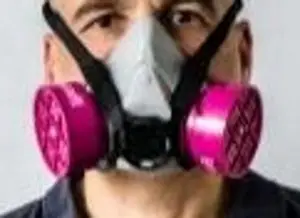N95 and p100 respirators are two types of personal protective equipment that protect people from different airborne particles. But how different are they? Find out below.
Is a P100 respirator better than a N95 respirator?
Both N95 and P100 respirators are made to filter out at least 95% of very small (0.3 microns) particles from the air, such as viruses, bacteria, and wildfire smoke.
However, P100 filtering facepiece respirators (FFRs), which have been authorized by the National Institute for Occupational Safety and Health, offer greater filter effectiveness than N95 filters. Contrary to popular belief, the former has greater flow resistance (Rf)
What does a P100 respirator protect against?
Respiratory protection from some oil and non-oil-based particles is provided by the NIOSH-approved P100 Particulate Filter.
How long can you wear a P100 respirator?
In general, the P100 filters used in Elastomeric Respirators have a lifetime of at least six months. In the event of a pandemic, this boosts the long-term ability to deliver PPE to healthcare professionals.
What does 100 mean for a P100 cartridge?
A mask with a “99” rating will block 99.9 percent of harmful particles, while a mask with a “100” rating would block 99.7 percent, making it practically impenetrable.
What does the 95 in N95 mean?
Respirators and cartridges must be able to filter at least 95% of particles with a diameter of 0.3 microns (or less) at an airflow of 85 lpm. Leakage is subtracted from 100% to arrive at the efficiency percentage. As a result, an N95 has a 5% leakage rate.
Related Questions and Answers
How long does Covid stay in the air indoors?
COVID-19 may be transmitted from a distance of more than six feet away by inhalation of the virus in the air. An infected person’s particles may spread over a whole room or indoor area. A person’s presence may also leave behind particles, which can stay airborne for many hours in certain situations
Is P100 better than N100?
Lead and asbestos need N100, although smoke would benefit greatly from its use. You’ll also know it’s there by looking for a “P.” The only distinction is that it also filters out oil-based aerosols if you’re dealing with chemicals, which is the only difference. Both P100 and N100 are capable of removing soot from the air.
How do I clean my N100 mask?
Remove the cartridges and filters from the respirator and clean the face piece using a pre-packaged wipe or a warm cleaning solution (no hotter than 120 degrees Fahrenheit) and a gentle brush. If required, add a little amount of neutral dishwashing liquid.
What mask protects against coronavirus?
This video provides some answers:
How do you store respirator cartridges?
Before storing respirators, clean them and allow them to dry thoroughly. Respirators should be kept dry and clean in an airtight container such as a zip-top plastic bag. Respirators and cartridges should always be stored separately. Respirators should be kept in a cold, dry cabinet that is solely for this purpose.
How do you know when to replace respirator cartridges?
If your filter’s stated expiry date has passed, it’s time to replace it. Even if you haven’t used the cartridges in six months, it’s a good idea to change them.
How long do N95 masks work?
In general, use an N95 mask for no more than two or three days at a time. Particles build up on an N95 mask when you inhale. If the mask has caught a lot of particles, it might make it more difficult to breathe.
Are 3M N95 masks good for Covid?
3M’s N95 respirators are NIOSH-approved and filter out at least 95 percent of airborne particles, including those that may carry viruses.
Are all N95 masks medical grade?
Surgical N95 respirators are both NIOSH-approved and FDA-cleared as surgical masks. They are both N95 respirators. Medical respirators, healthcare respirators, and surgical N95s are all terms used to describe these devices.
Where are Honeywell N95 masks made?
Honeywell N95 masks are produced in Rhode Island.
Conclusion
N95 and P100 respirators effectively prevent dangerous particles from entering the wearer’s lungs. However, they are not precisely the same in terms of overall protection.
The “N95 vs P100 respirators” debate has been raging for years. The answer to the question is that the N95 masks protect against more particles than the P100 mask.
NEXT UP: How Do You Use an SCBA Respirator?
Related Tags
- p100 mask for covid protection
- p95 vs n95 mask for covid-19
- 3m p100 mask covid
- gvs elipse p100 covid
- p100 filter

